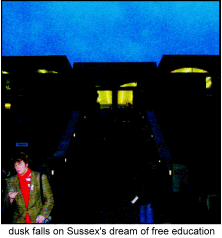
by ALEX OGLE & NICK SCOTT
New university funding plans,
announced this week, will
give institutions such as
Sussex the right to charge radically
higher fees. In many cases tuition
fees, presently frozen at £1,100 a
year, may triple to over £3,000.
However, with such a system in
place, universities will have the
right to charge up to £20,000 a year,
piling on the daunting pressure of
paying back mammoth loans in
years to come.
Vice-Chancellor Alasdair Smith -
already in the process of being
declared in a position of no confidence
by the Free Education Society - has
expressed enthusiasm for such a
scheme. In a letter to the badger
printed on page five), Smith states
that he "broadly welcomes"the proposed
new system. Smith has been
quite a vocal campaigner for the introduction
of top-fees in recent months,
even meeting with Tony Blair at the
end of last year, along with a number
of other Vice-Chancellors, to argue in
favour of the plan.
 There is a high chance that Sussex
may be one of the first universities to
introduce extra fees. This could mean a
dramatic change in the intake of students
at Sussex, leading to a situation
where Sussex is ranked alongside
Oxford and Cambridge in terms of
exclusivity, though not in terms of
teaching quality. With Sussex’s
notoriously low contact hours for arts students
already causing many students
to question where their tuition fees are
going, the prospect of £3000 a year
fees for less than five hours of contact
time a week seems to pose many pertinent
questions on the direction
Sussex is taking.
There is a high chance that Sussex
may be one of the first universities to
introduce extra fees. This could mean a
dramatic change in the intake of students
at Sussex, leading to a situation
where Sussex is ranked alongside
Oxford and Cambridge in terms of
exclusivity, though not in terms of
teaching quality. With Sussex’s
notoriously low contact hours for arts students
already causing many students
to question where their tuition fees are
going, the prospect of £3000 a year
fees for less than five hours of contact
time a week seems to pose many pertinent
questions on the direction
Sussex is taking.
Sussex has long had an emphasis
on research over teaching, and there
seems little indication that this will
change with the increased fees. During
the Vice-Chancellor’s time at this university,
many of the aspects considered
"special" about Sussex teaching have
been gradually eroded. With the end
of the old school system accompanied
by increasing seminar sizes and
decreasing contact hours, it will be
hard to convince cash-strapped students
that what is in terms of league
tables and results an average
university,is worth the extra cash.
A number of spokespeople on free
education have come out against
these latest proposals, claiming them
to be ’social and economic elitism to
the extreme.’ Liberal Democrat
Education Spokesman Phil Willis
accused ministers of a ‘sell-out for
Britain’s students and our universities.’
An ‘access regulator’ will be
appointed if the plan goes through,
whose job it will be to ensure poorer
pupils can enter elite institutions.
These universities will ‘lose their right
to charge higher fees’ if they fail to
improve their record of taking students
from poorer backgrounds, but even
such an idea will inevitably fail to save
thousands of potential students from
being able to pay the fees. The
National Association of Teachers in
Further and Higher Education said at
the weekend that variable fees would
drain the life-blood’ from the university
system.
In a classic ploy from the New
Labour government to diffuse opposition
to the introduction new scheme,
it has pledged to re-introduce grants
to students whose parents fall into the
lowest income bracket. Furthermore,
the poorest universities, already in dire
financial straits due to lack of government
funding, will suffer more at the
hands of the proposed top-up fees as a
complex tiered form of graduate tax
and the differential fees would mean
universities would be able to set fees at
differing levels, depending on the
course and prestige of the university.
The inequalities already existing within
higher education, such as facilities,
services and class sizes, will thus
inevitably become greater.
The badger will continue to bring
you the latest on the changes to
university funding, particularly
those that affect Sussex students.
Look out for an exclusive interview
with Vice-Chancellor Alisdair
Smith in the badger next week.

|
